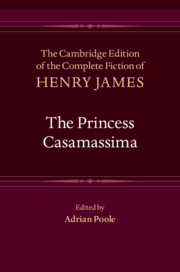Book contents
- Frontmatter
- Contents
- List of Illustrations
- Acknowledgements
- List of Abbreviations
- General Editors’ Preface
- General Chronology of James’s Life and Writings
- Introduction
- Textual Introduction
- Chronology of Composition and Production
- Bibliography
- The Princess Casamassima
- Glossary of Foreign Words and Phrases
- Notes
- Textual Variants I: Substantive Variants up to Copy Text
- Textual Variants II: Substantive Variants after Copy Text
- Emendations
- Appendix: Preface to New York Edition
XXVII
Published online by Cambridge University Press: 11 April 2021
- Frontmatter
- Contents
- List of Illustrations
- Acknowledgements
- List of Abbreviations
- General Editors’ Preface
- General Chronology of James’s Life and Writings
- Introduction
- Textual Introduction
- Chronology of Composition and Production
- Bibliography
- The Princess Casamassima
- Glossary of Foreign Words and Phrases
- Notes
- Textual Variants I: Substantive Variants up to Copy Text
- Textual Variants II: Substantive Variants after Copy Text
- Emendations
- Appendix: Preface to New York Edition
Summary
Hyacinth knew there was something out of the way as soon as he saw Lady Aurora's face look forth at him, in answer to his tap, while she held the door ajar. What was she doing in Pinnie's bedroom? — a very poor place, into which the dressmaker, with her reverence, would never have admitted a person of that quality unless things were pretty bad. She was solemn, too; she didn't laugh, as usual; she had removed her large hat, with its limp, old-fashioned veil, and she raised her finger to her lips. Hyacinth's first alarm had been immediately after he let himself into the house, with his latch-key, as he always did, and found the little room on the right of the passage, in which Pinnie had lived ever since he remembered, fireless and untenanted. As soon as he had paid the cabman, who put down his portmanteau for him in the hall (he was not used to paying cabmen, and was conscious he gave him too much, but was too impatient, in his sudden anxiety, to care), he hurried up the vile staircase, which seemed viler, even through his preoccupation, than ever, and gave the knock, accompanied by a call the least bit tremulous, immediately answered by Lady Aurora. She drew back into the room a moment, while he stared, in his dismay; then she emerged again, closing the door behind her — all with the air of enjoining him to be terribly quiet. He felt, suddenly, so sick at the idea of having lingered at Medley while there was distress in the wretched little house to which he owed so much, that he scarcely found strength for an articulate question, and obeyed, mechanically, the mute, urgent gesture by which Lady Aurora appealed to him to go downstairs with her. It was only when they stood together in the deserted parlour (it was as if he perceived for the first time what an inelegant odour prevailed there), that he asked, “Is she dying — is she dead?” That was the least the strained sadness looking out from the face of the noble visitor appeared to announce.
“Dear Mr. Robinson, I’m so sorry for you. I wanted to write, but I promised her I wouldn’t. She is very ill — we are very anxious. It began ten days ago, and I suppose I must tell you how much she has gone down.”
- Type
- Chapter
- Information
- The Princess Casamassima , pp. 272 - 281Publisher: Cambridge University PressPrint publication year: 2020

